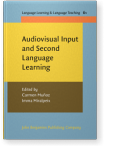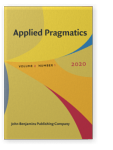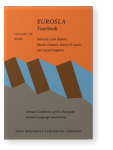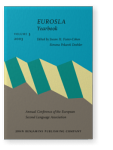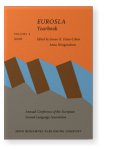M. Luz Celaya
List of John Benjamins publications for which M. Luz Celaya plays a role.
2024 Multimodal input and L2 pragmatics: An eye-tracking study Audiovisual Input and Second Language Learning, Muñoz, Carmen and Imma Miralpeix (eds.), pp. 126–149 | Chapter
Analyzing the effects of multimodal input in the acquisition of second/foreign language (L2) pragmatics is a recent area in research. In this line, the use of eye-tracking to investigate L2 pragmatics remains limited (Godfroid, 2019). This study aimed to explore the effects of multimodal input… read more
2020 Learning pragmatics through tasks: When interaction plays a role Applied Pragmatics 2:1, pp. 1–25 | Article
This study aims at examining the benefits of teaching L2 pragmatics with the use of tasks. The participants were 50 Catalan/Spanish bilingual students (aged 12–14) from three intact classes who were learners of English as a Foreign Language and with an upper-intermediate level of proficiency. The… read more
2010 Developing pragmatic fluency in an EFL context EUROSLA Yearbook: Volume 10 (2010), Roberts, Leah, Martin Howard, Muiris Ó Laoire and David Singleton (eds.), pp. 38–61 | Article
Studies on pragmatic development, especially on the development of pragmatic fluency, are still scarce in the area of Interlanguage Pragmatics. The present study analyses whether EFL learners (N = 144), from Primary to University levels, who have not been instructed in pragmatics nevertheless show… read more
2003 Long-term effects of an earlier start: An analysis of EFL written production EUROSLA Yearbook: Volume 3 (2003), Foster-Cohen, Susan H. and Simona Pekarek Doehler (eds.), pp. 103–129 | Article
The aim of this paper is to analyse the development of the written production of six groups of learners (N=520) in a formal instruction setting and to investigate the effects of onset and age on the levels of attainment in writing performance. The written production was measured after 200, 416 and… read more
2001 Short and mid-term effects of an earlier start: An analysis of EFL written production EUROSLA Yearbook: Volume 1 (2001), Foster-Cohen, Susan H. and Anna Nizegorodcew (eds.), pp. 195–209 | Article
Most studies concerning the issue of age have focused on the language outcomes of subjects who started acquiring a second language during childhood, or later on during adolescence or adulthood in naturalistic contexts. However, relatively few studies have been concerned with school contexts where… read more
